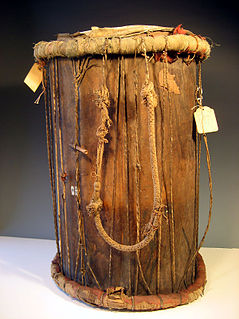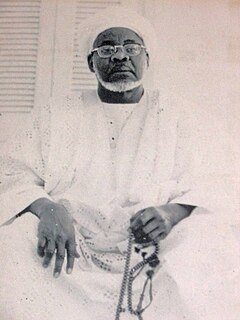Related Research Articles

The Gambia, officially the Republic of The Gambia, is a country in West Africa. It is the smallest country within mainland Africa and is surrounded by Senegal, except for its western coast on the Atlantic Ocean. The Gambia is situated on both sides of the lower reaches of the Gambia River, the nation's namesake, which flows through the centre of the Gambia and empties into the Atlantic Ocean. It has an area of 10,689 square kilometres (4,127 sq mi) with a population of 1,857,181 as of the April 2013 census. Banjul is the Gambian capital and the country's largest metropolitan area. The largest cities are Serekunda and Brikama.

Senegal's music is best known abroad due to the popularity of mbalax, a development of Serer conservative njuup music and sabar drumming popularized internationally by Youssou N'Dour.

Ibrāhīm Niasse (1900–1975)—or French: Ibrahima Niasse, Wolof: Ibrayima Ñas, Arabic: شيخ الإسلام الحاج إبراهيم إبن الحاج عبد الله التجاني الكولخي Shaykh al-'Islām al-Ḥājj Ibrāhīm ibn al-Ḥājj ʿAbd Allāh at-Tijānī al-Kawlakhī —was a Senegalese major leader (wolof) of the Tijānī Sufi order of Islam in West Africa. His followers in the Senegambia region affectionately refer to him in Wolof as Baay, or "father."

The Wolof people are a West African ethnic group found in northwestern Senegal, the Gambia, and southwestern coastal Mauritania. In Senegal, the Wolof are the largest ethnic group (~43.3%), while elsewhere they are a minority. They refer to themselves as Wolof and speak the Wolof language, in the West Atlantic branch of the Niger–Congo family of languages.
The Serer people are a West African ethnoreligious group. They are the third-largest ethnic group in Senegal, making up 15% of the Senegalese population. They are also found in northern Gambia and southern Mauritania.
Asi Florence Peters Mahoney is a Gambian Creole or "Aku" author and historian, and was the first Gambian woman to be awarded a PhD.

Alieu Ebrima Cham Joof commonly known as Cham Joof or Alhaji Cham Joof, was a Gambian historian, politician, author, trade unionist, broadcaster, radio programme director, scout master, Pan-Africanist, lecturer, columnist, activist and an African nationalist who advocated for the Gambia's independence during the colonial era.
Linguere Ndoye Demba Joos Fadiou, also known as Ndoye Demba in Senegambian dynastic history, was a Serer princess from the Kingdom of Sine, from the later half of the 14th century to the 15th century. The royal title – "Lingeer" means Queen or Royal Princess. She was given in marriage to the Brak of Waalo – Caaka Mbaar Mbooj. The surname Mbooj is the English spelling in the Gambia, variation include Mboge. In French speaking Senegal, it is spelt Mbodj. Differences in spelling is due to the colonial past of the Gambia and Senegal. France colonized Senegal, whilst Britain colonized the Gambia, thus the division of the two countries. Caaka Mbaar was the second king of Waalo from the Mbooj patrilineage, who ruled in the second half of the 14th century, around 1367. Brak was the title of the kings of Waalo. Lingeer Ndoye Demba was the founder of the Serer Joos Maternal Dynasty of Waalo. In the Wolof Kingdom of Waalo, Lingeer Ndoye Demba is considered the matriarch of the Joos maternal clan. In the Serer Kingdom of Sine, it is her grandmother Lingeer Fatim Beye who is considered to be the matriarch of this maternal dynasty. In the Serer language, the word "Fa-tim" means "the maternal clan of ... ". The Serer surname Beye is also one of the many Serer maternal clans.

Lingeer was the title given to the mother or sister of a king in the Serer kingdoms of Sine, Saloum, and previously the Kingdom of Baol; and the Wolof kingdoms of Cayor, Jolof, Baol and Waalo in pre-colonial Senegal. The word "Lingeer" means "queen" or "princess" in Serer and Wolof language. The Lingeer was considered the “great princess of royal courts.” These kingdoms utilized a bilineal system, as a candidate for kingship could not succeed to the throne if he was not a member of the reigning materlineage, and thus, the Lingeer's maternal lineage was highly significant. In similarity, a candidate could not succeed to the throne as king if he was not a member of the noble reigning patriclans. That was particular so among the Serer who retained much of their old culture, customs and traditional religion where women played a significant role compared to the Wolof who adopted Islam. Various Lingeers have been noted for their resistance efforts to colonial conquest.

The Gambia Colony and Protectorate was the British colonial administration of the Gambia from 1821 to 1965, part of the British Empire in the New Imperialism era. The colony was the immediate area surrounding Bathurst, and the protectorate was the inland territory situated around the Gambia River, which was declared in 1894.

Hassoum Ceesay is a Gambian historian, writer and museum curator at the Gambia National Museum. He is one of the most prolific Gambian historians.

Tijan M. Sallah is a Gambian poet and prose writer.
Fatou Jaw-Manneh is a Gambian journalist and activist who received political asylum from the United States in 1994 and has lived in the U.S. ever since. She is a well-known member of the Gambian community in the U.S. and runs the popular news and politics website Maafanta.com. She was the first female reporter at the Gambian Daily Observer and is widely known as “Gambia's Iron Lady” and the “Dame of the Flaming Pen.”
Hawa Sisay-Sabally is a Gambian lawyer who served as Attorney General from 1996–1998 and has since spoken out against corruption in The Gambia and represented opposition politicians in criminal cases regarding their participation in pro-democracy protests.
Louise Antoinette N'Jie, was a Gambian teacher, feminist and politician who was the first woman to serve as a cabinet minister in The Gambia.

Sir Edward John Cameron was a British colonial administrator who served as governor of the Gambia from February 1914 to 1920.
Fenda Lawrence, was an African slave trader who operated in the Saloum town of Kaur. In 1772 she visited the Thirteen Colonies as a free black woman for both tourism and to trade.
Daniel Robertson was a British colonial administrator who served as Colonial Secretary of the Gambia from 1849 to circa 1865. He was Acting Governor of the Gambia from April 1859 to September 1859, and in 1851.
Sally P. C. Njie or N'Jie was a Gambian librarian. She was the first Chief Librarian at the National Library of The Gambia.
Lingeer Ngoné Dièye was a Lingeer from the Kingdom of Saloum, and early ancestor of the Guedj maternal dynasty of Cayor and Baol. She was the wife of the 17th century present day Senegalese noble and Teigne Thié Yasin Demba Noudj Fall, and mother of the controversial Damel—Teigne Lat Soukabé Ngoné Fall who ruled as King of Cayor and Baol from 1697 to 1719 and became the first Guedj to rule in those kingdoms—after overthrowing the reigning maternal dynasty and installing his mother's matriclan. In usurping the throne, he committed fratricide by killing his paternal half-brother and took his throne. Ngoné Dièye was a Serer noble of the Dièye family of Saloum. In the Wolof Kingdom of Cayor, she became Queen when she married the King of Cayor, and later Queen Mother of Cayor and Baol when her son usurped the throne and unified Cayor and Baol. According to Cheikh Anta Diop, "The Guedj come from common people. They are distinguished by their adaptive ability and their military genius. The dynasty is named for the country of origin of the first founding Damel's mother. She was a commoner from the seacoast, who married the King; guedj meaning "sea" in Wolof. Her son, though he had no right to the throne, succeeded in being crowned, through his energy and mental agility."
References
- 1 2 3 4 5 6 7 hassoum, ceesay (2012), Akyeampong, Emmanuel K; Gates, Henry Louis (eds.), "Khan, Fatou", Dictionary of African Biography, Oxford University Press, doi:10.1093/acref/9780195382075.001.0001, ISBN 978-0-19-538207-5 , retrieved 2021-01-16
- 1 2 "Gambian Women: An Introductory History - The Point". thepoint.gm. Retrieved 2021-01-16.
- 1 2 3 4 5 Ceesay, Hassoom (2020). "FATOO KHAN, THE COLONIAL COMMISSIONER'S MISTRESS: AN AMOROUS RELATIONSHIP IN COLONIAL GAMBIA". Igwebuike: An African Journal of Arts and Humanities (in German). 6 (2). doi:10.13140/RG.2.2.12241.35684.
- ↑ Jallow, B. (2014-12-04). Leadership in Colonial Africa: Disruption of Traditional Frameworks and Patterns. Springer. p. 32. ISBN 978-1-137-47809-2.